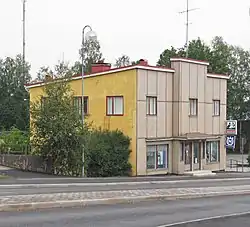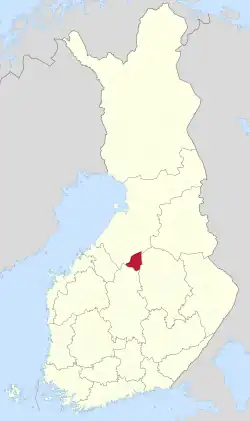Pyhäjärvi | |
|---|---|
Town | |
| Pyhäjärven kaupunki Pyhäjärvi stad | |
 | |
 Coat of arms | |
 Location of Pyhäjärvi in Finland | |
| Coordinates: 63°41′N 025°59′E / 63.683°N 25.983°E | |
| Country | |
| Region | North Ostrobothnia |
| Sub-region | Nivala–Haapajärvi |
| Charter | 1866 |
| Town privileges | 1993 |
| Seat | Pyhäsalmi |
| Government | |
| • Town manager | Henrik Kiviniemi |
| Area (2018-01-01)[1] | |
| • Total | 1,459.46 km2 (563.50 sq mi) |
| • Land | 1,310.25 km2 (505.89 sq mi) |
| • Water | 148.42 km2 (57.31 sq mi) |
| • Rank | 53rd largest in Finland |
| Population (2023-09-30)[2] | |
| • Total | 4,777 |
| • Rank | 173rd largest in Finland |
| • Density | 3.65/km2 (9.5/sq mi) |
| Population by native language | |
| • Finnish | 98.4% (official) |
| • Swedish | 0.2% |
| • Others | 1.4% |
| Population by age | |
| • 0 to 14 | 14.2% |
| • 15 to 64 | 50.3% |
| • 65 or older | 35.5% |
| Time zone | UTC+02:00 (EET) |
| • Summer (DST) | UTC+03:00 (EEST) |
| Website | www |
Pyhäjärvi (1993–1995 Pyhäsalmi) is a town and municipality in the south of Northern Ostrobothnia region, Finland. Pyhäjärvi also borders the Northern Savonia and Central Finland regions. The town belongs to the subregion of Nivala–Haapajärvi. Its seat is in Pyhäsalmi.
Neighbouring municipalities are Haapajärvi, Kiuruvesi, Kärsämäki, Pielavesi, Pihtipudas and Pyhäntä. As the highway 4 (E75), the highway 27 and the Ylivieska–Iisalmi railway all run through the town, Pyhäjärvi is well situated in an intersection of communication and transport services. The town has also an airfield.[5]
The town of Pyhäjärvi was founded in 1866, and it was then named after Lake Pyhäjärvi, a lake of 125 square kilometres (48 sq mi) and rich in fish. Pyhäjärvi became officially a town in January 1993. The town has 4,777 inhabitants (30 September 2023),[2] of whom some 60 percent live in the two population centres Pyhäsalmi and Ruotanen. It is the second smallest town of Finland in term of population after Kaskinen in the Ostrobothnia region.[6]
Pyhäjärvi contains Europe's deepest base metal mine, the 1,444 metres (4,738 ft) deep Pyhäsalmi Mine from where zinc and copper is mined. Underground mining was due to end in 2019,[6] but has been granted approximately 14 months more of mining activity due to an increase in demand for pyrite from Yara in Siilinjärvi.[7] The on-surface refinery will be operational until 2025.[8] The mine facilities and the associated infrastructure will be used for underground business and research under the Callio Pyhäsalmi project.[8][9]
See also
References
- ↑ "Area of Finnish Municipalities 1.1.2018" (PDF). National Land Survey of Finland. Retrieved 30 January 2018.
- 1 2 "Preliminary population statistics 2023, September". StatFin. Statistics Finland. Retrieved 26 October 2023.
- ↑ "Demographic Structure by area as of 31 December 2022". Statistics Finland's PX-Web databases. Statistics Finland. Retrieved 6 September 2023.
- ↑ "Population according to age (1-year) and sex by area and the regional division of each statistical reference year, 2003–2020". StatFin. Statistics Finland. Retrieved 2 May 2021.
- ↑ "EFPY Pyhäsalmi, Finland". VFR Suomi / Finland. Finavia. 12 February 2009. Archived from the original on 16 October 2007. Retrieved 13 March 2009.
- 1 2 Euroopan syvin kaivos suljetaan ja elämä pikkuruisella Pyhäjärvellä mullistuu – tästä kaikki alkoi: ”Isän lapio osui outoon kiveen” – Ilta-Sanomat (in Finnish)
- ↑ "Pyhäsalmen kaivos sai yli vuoden jatkoajan lannoitetehtaan ansiosta". Yle Uutiset (in Finnish). Retrieved 2020-01-12.
- 1 2 Jokinen, Juha Veli (January 29, 2018). "Euroopan syvin kaivos lopettaa Pyhäsalmella - tilalle sirkkoja, salaattiviljelyä ja energiavarasto" (in Finnish). Retrieved 2018-03-04.
- ↑ "First Quantum Minerals Ltd. - Our Business - Operating Mines - Pyhäsalmi". www.first-quantum.com. Retrieved 2018-03-04.
External links
 Media related to Pyhäjärvi (municipality) at Wikimedia Commons
Media related to Pyhäjärvi (municipality) at Wikimedia Commons- Town of Pyhäjärvi – Official website
